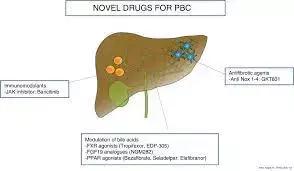Seladelpar Significantly Improves Liver Biochemistry And Pruritus In Patients With Primary Biliary Cholangitis
- byDoctor News Daily Team
- 02 August, 2025
- 0 Comments
- 0 Mins

Seladelpar significantly improves liver biochemistry and pruritus in patients with primary biliary cholangitis suggests a new study published in the Hepatology
PAUSE
UNMUTE
:
FULLSCREEN
ENHANCE was a phase 3 study that evaluated efficacy and safety of seladelpar, a selective peroxisome proliferator-activated receptor-δ (PPAR) agonist, versus placebo in patients with primary biliary cholangitis with inadequate response or intolerance to ursodeoxycholic acid (UDCA).
Approach and Results:
Patients were randomized 1:1:1 to oral seladelpar 5 mg (n=89), 10 mg (n=89), placebo (n=87) daily (with UDCA, as appropriate). Primary end point was a composite biochemical response [alkaline phosphatase (ALP) < 1.67×upper limit of normal (ULN), ≥15% ALP decrease from baseline, and total bilirubin ≤ ULN] at month 12. Key secondary end points were ALP normalization at month 12 and change in pruritus numerical rating scale (NRS) at month 6 in patients with baseline score ≥4. Aminotransferases were assessed. ENHANCE was terminated early following an erroneous safety signal in a concurrent, NASH trial. While blinded, primary and secondary efficacy end points were amended to month 3. Significantly more patients receiving seladelpar met the primary end point (seladelpar 5 mg: 57.1%, 10 mg: 78.2%) versus placebo (12.5%) (p < 0.0001). ALP normalization occurred in 5.4% (p=0.08) and 27.3% (p < 0.0001) of patients receiving 5 and 10 mg seladelpar, respectively, versus 0% receiving placebo. Seladelpar 10 mg significantly reduced mean pruritus NRS versus placebo [10 mg: −3.14 (p=0.02); placebo: −1.55]. Alanine aminotransferase decreased significantly with seladelpar versus placebo [5 mg: 23.4% (p=0.0008); 10 mg: 16.7% (p=0.03); placebo: 4%]. There were no serious treatment-related adverse events.
Patients with primary biliary cholangitis (PBC) with inadequate response or intolerance to UDCA who were treated with seladelpar 10 mg had significant improvements in liver biochemistry and pruritus. Seladelpar appeared safe and well tolerated
Reference:
Hirschfield, Gideon M.1; Shiffman, Mitchell L.2,3; Gulamhusein, Aliya4; Kowdley, Kris V.5; Vierling, John M.6; Levy, Cynthia7; Kremer, Andreas E.8; Zigmond, Ehud9; Andreone, Pietro10,11; Gordon, Stuart C.12; Bowlus, Christopher L.13; Lawitz, Eric J.14; Aspinall, Richard J.15; Pratt, Daniel S.16; Raikhelson, Karina17,18; Gonzalez-Huezo, Maria S.19; Heneghan, Michael A.20; Jeong, Sook-Hyang21; Ladrón de Guevara, Alma L.22; Mayo, Marlyn J.23; Dalekos, George N.24; Drenth, Joost P.H.25; Janczewska, Ewa26,27; Leggett, Barbara A.28; Nevens, Frederik29,30; Vargas, Victor31,32; Zuckerman, Eli33; Corpechot, Christophe34; Fassio, Eduardo35; Hinrichsen, Holger36; Invernizzi, Pietro37,38; Trivedi, Palak J.39,40,41,42; Forman, Lisa43; Jones, David E.J.44; Ryder, Stephen D.45; Swain, Mark G.46; Steinberg, Alexandra47; Boudes, Pol F.47; Choi, Yun-Jung47; McWherter, Charles A.47; ENHANCE Study Group*. Seladelpar efficacy and safety at 3 months in patients with primary biliary cholangitis: ENHANCE, a phase 3, randomized, placebo-controlled study. Hepatology 78(2):p 397-415, August 2023. | DOI: 10.1097/HEP.0000000000000395
Keywords:
Seladelpar, significantly, improves, liver, biochemistry, pruritus, patients, primary, and biliary cholangitis, Hirschfield, Gideon M; Shiffman, Mitchell L.; Gulamhusein, Aliya; Kowdley, Kris V.5; Vierling, John Levy, Cynthia; Kremer, Andreas E; Zigmond, Ehud9; Andreone, Pietro; Gordon, Stuart C, Hepatology
Disclaimer: This website is designed for healthcare professionals and serves solely for informational purposes.
The content provided should not be interpreted as medical advice, diagnosis, treatment recommendations, prescriptions, or endorsements of specific medical practices. It is not a replacement for professional medical consultation or the expertise of a licensed healthcare provider.
Given the ever-evolving nature of medical science, we strive to keep our information accurate and up to date. However, we do not guarantee the completeness or accuracy of the content.
If you come across any inconsistencies, please reach out to us at
admin@doctornewsdaily.com.
We do not support or endorse medical opinions, treatments, or recommendations that contradict the advice of qualified healthcare professionals.
By using this website, you agree to our
Terms of Use,
Privacy Policy, and
Advertisement Policy.
For further details, please review our
Full Disclaimer.
Tags:
Recent News
AI Reads Mammograms to Predict Heart Disease Risk...
- 18 September, 2025
Study Reveals Mediterranean Diet Reduces Gum Infla...
- 18 September, 2025
Lower Irisin Levels Linked to Diabetic Nephropathy...
- 18 September, 2025
Androgenic anabolic steroids exposure associated w...
- 18 September, 2025
Daily Newsletter
Get all the top stories from Blogs to keep track.


0 Comments
Post a comment
No comments yet. Be the first to comment!